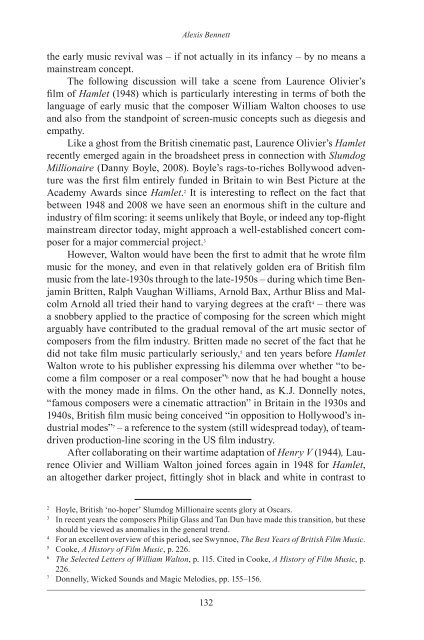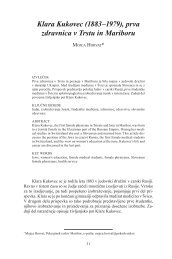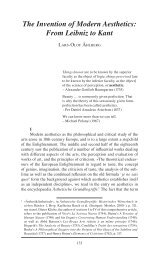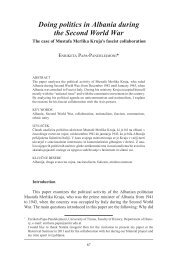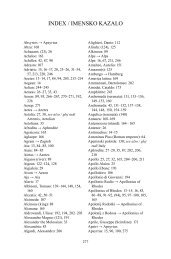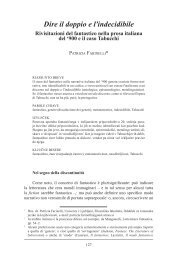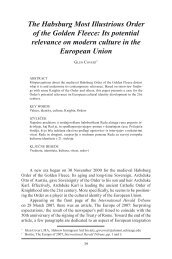HS 9 - HistoriÄni seminar ZRC SAZU
HS 9 - HistoriÄni seminar ZRC SAZU
HS 9 - HistoriÄni seminar ZRC SAZU
Create successful ePaper yourself
Turn your PDF publications into a flip-book with our unique Google optimized e-Paper software.
Alexis Bennett<br />
the early music revival was – if not actually in its infancy – by no means a<br />
mainstream concept.<br />
The following discussion will take a scene from Laurence Olivier’s<br />
film of Hamlet (1948) which is particularly interesting in terms of both the<br />
language of early music that the composer William Walton chooses to use<br />
and also from the standpoint of screen-music concepts such as diegesis and<br />
empathy.<br />
Like a ghost from the British cinematic past, Laurence Olivier’s Hamlet<br />
recently emerged again in the broadsheet press in connection with Slumdog<br />
Millionaire (Danny Boyle, 2008). Boyle’s rags-to-riches Bollywood adventure<br />
was the first film entirely funded in Britain to win Best Picture at the<br />
Academy Awards since Hamlet. 2 It is interesting to reflect on the fact that<br />
between 1948 and 2008 we have seen an enormous shift in the culture and<br />
industry of film scoring: it seems unlikely that Boyle, or indeed any top-flight<br />
mainstream director today, might approach a well-established concert composer<br />
for a major commercial project. 3<br />
However, Walton would have been the first to admit that he wrote film<br />
music for the money, and even in that relatively golden era of British film<br />
music from the late-1930s through to the late-1950s – during which time Benjamin<br />
Britten, Ralph Vaughan Williams, Arnold Bax, Arthur Bliss and Malcolm<br />
Arnold all tried their hand to varying degrees at the craft 4 – there was<br />
a snobbery applied to the practice of composing for the screen which might<br />
arguably have contributed to the gradual removal of the art music sector of<br />
composers from the film industry. Britten made no secret of the fact that he<br />
did not take film music particularly seriously, 5 and ten years before Hamlet<br />
Walton wrote to his publisher expressing his dilemma over whether “to become<br />
a film composer or a real composer” 6 now that he had bought a house<br />
with the money made in films. On the other hand, as K.J. Donnelly notes,<br />
“famous composers were a cinematic attraction” in Britain in the 1930s and<br />
1940s, British film music being conceived “in opposition to Hollywood’s industrial<br />
modes” 7 – a reference to the system (still widespread today), of teamdriven<br />
production-line scoring in the US film industry.<br />
After collaborating on their wartime adaptation of Henry V (1944), Laurence<br />
Olivier and William Walton joined forces again in 1948 for Hamlet,<br />
an altogether darker project, fittingly shot in black and white in contrast to<br />
2<br />
Hoyle, British ‘no-hoper’ Slumdog Millionaire scents glory at Oscars.<br />
3<br />
In recent years the composers Philip Glass and Tan Dun have made this transition, but these<br />
should be viewed as anomalies in the general trend.<br />
4<br />
For an excellent overview of this period, see Swynnoe, The Best Years of British Film Music.<br />
5<br />
Cooke, A History of Film Music, p. 226.<br />
6<br />
The Selected Letters of William Walton, p. 115. Cited in Cooke, A History of Film Music, p.<br />
226.<br />
7<br />
Donnelly, Wicked Sounds and Magic Melodies, pp. 155–156.<br />
132


